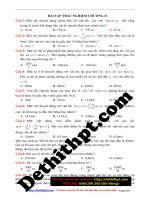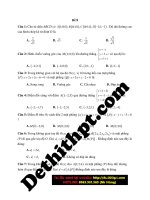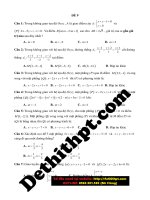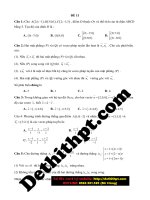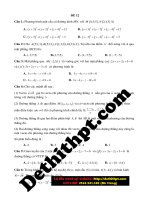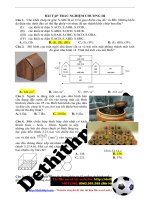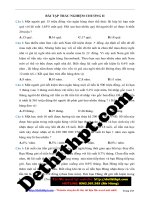Đề 26 image marked image marked
Bạn đang xem bản rút gọn của tài liệu. Xem và tải ngay bản đầy đủ của tài liệu tại đây (1.06 MB, 8 trang )
Exercise 26:
Read the following passage and mark the letter A, B, c or D to indicate the correct answer to each
of the questions.
Television has transformed politics in the United States by changing the way in which information is
disseminated, by altering political campaigns, and by changing citizen's patterns of response to politics.
By giving citizens independent access to the candidates, television diminished the role of the political
party in the selection of the major party candidates. By centering politics on the person of the candidates,
television accelerated the citizen's focus on character rather than issues.
Television has altered the forms of political communication as well. The messages on which most of
US reply are briefer than they once were. The stump speech, a political speech given by travelling
politicians and lasting 1/2 to 2 hours, which characterized nineteenth-century political discourse, has
given way to the 30-second advertisement and the 10 second "sound bite" in broadcast news. Increasingly
the audience for speeches is not that standing in front of the politician but rather the viewing audience
tvho will hear and see a snippet of the speech on the news.
In these abbreviated forms, much of what constituted the traditional political discourse of earlier ages
has been lost. In 15 or 30 seconds, a peaker cannot establish the historical context that shaped the issue in
question, cannot detail the probable causes of the problem, and cannot examine alternative proposals to
argue that one is preferable to others. In snippets, politicians assert but do not argue.
Đăng ký file Word tại link sau
/>
Because television is an intimate medium, speaking through it require a changed political style that
was more conversational, personal, and visual than that of the old-style stump speech. Reliance on
television means that increasingly our political world contains memorable pictures rather than memorable
words. Schools teach US to analyze words and print. However, in a word in which politics is increasingly
visual, informed citizenship requires a new set of skills.
Recognizing the power of television's pictures, politicians craft televisual, staged events, called
pseudo-event, designed to attract media coverage.
Much of the political activity we see on television news has been crafted by politicians, their
speechwriters, and their public relations advisers for televised consumption. Sound bites in news and
answers to questions in debates increasingly sound like advertisements.
Trang 1
QUESTIONS:
Question 1: What is the main point of the passage?
A. Citizens in the United States are now more informed about political issues because of television
coverage.
B. Citizens in the United States prefer to see politicians on television instead of in person.
C. Politics in the United States has become substantially more controversial since the introduction of
television.
D. Politics in the United States has been significantly changed by television.
Question 2: The word "disseminated" in paragraph 1 is closest in meaning to_____.
A. analyzed
B. discussed
C. spread
D. stored
Question 3: It can be inferred that before the introduction of television, political parties
A. had more influence over the selection of political candidates
B. spent more money to promote their political candidates
C. attracted more members
D. received more money
Question 4: The word "accelerated" in paragraph 1 is closest in meaning to _____.
A. allowed
B. increased
C. required
D. stared
Question 5: The author mentions the "stump speech” in paragraph 2 as an example of ___.
A. an event created by politicians to attract media attention
B. an interactive discussion between two politicians
C. a kind of political presentation typical of the nineteenth century
D. a style of speech common to televised political events
Question 6: The phrase "given way to" in paragraph 2 is closest in meaning to ______.
A. added interest to
B. modified
C. imitated
D. been replaced by
Question 7: The word "that" in paragraph 2 refers to _______.
A. audience
B. broadcast news
C. politician
D. advertisement
Question 8: According to the passage, as compared with televised speeches, traditional political
discourse was more successful at_________________.
A. allowing news coverage of political candidates
Trang 2
B. placing political issues within a historical context
C. making politics seem more intimate to citizens
D. providing detailed information about a candidates private behavior
Question 9: The author states that "politicians assert but do not argue" in order to suggest that
politicians ________________.
A. make claims without providing reasons for the claims
B. take stronger positions on issues than in the past
C. enjoy explaining the issue to broadcasters
D. dislike having to explain their own positions on issues to citizens
Question 10: The purpose of paragraph 4 is to suggest that __________________.
A. politicians will need to learn to become more personal when meeting citizens
B. politicians who are considered very attractive are favored by citizens over politicians who are less
attractive
C. citizens tend to favor a politician who analyzed the issue over one who does not
D. citizens will need to learn how to evaluate visual political images in order to become better informed
Question 11: According to paragraph 5, staged political events are created so that politicians can _____.
A. create more time to discuss political issues
B. obtain more television coverage for themselves
C. spend more time talking to citizens in person
D. engages in debates with their opponents
GIẢI CHI TIẾT
Question 1: What is the main point of the passage?
A. citizens in the US are now more informed about political issues because of television coverage.
B. citizens in the US prefer to see politicians on television instead of in person.
C. politics in the US has become substantially more controversal since the introduction of television.
D. politics in the US has been significantly changed by television.
Dịch nghĩa: Ý chính của bài viết là gì?
A. Người dân Mỹ ngày nay bắt kịp thông tin chính trị hơn nhờ có TV.
B. Người dân Mỹ thích thấy chính trị gia trên TV hơn là gặp trực tiếp.
C. Nền chính trị Mỹ đã trở nên căng thẳng hơn nhiều từ sự ra đời của TV.
D. Nền chính trị Mỹ đã được thay đổi rất nhiều bởi TV.
Giải thích: Ta thấy câu đầu tiên của bài viết: "Television has transformed politics in the United States by
changing the way in which information is disseminated, by altering political campaign, and by changing
Trang 3
citizen's patterns of response to politics"-"Ti vi đã biến đổi nền chính trị ở Mỹ bằng cách thay đổi con
đường truyền bá thông tin, bằng việc thay thế những chiến dịch chính trị, và bằng thay đổi cách mà người
dân phản ứng lại nền chính trị."
Question 2: The word "disseminated" in paragraph 1 is closest in meaning to ___.
A. analyzed
B. discussed
C. spread
D. stored
Dịch nghĩa: Từ "disseminated" ở đoạn 1 gần nghĩa nhất với ____.
A.phân tích
B. thảo luận
C. lan truyền
D. lưu trữ
Giải thích: ta có be disseminated - be spread: được lan truyền, truyền bá_______.
Question 3: It can be inferred that before the inroduction of television, political parties
A. had more influence over the selection of the candidates
B. spent more money to promote their political candidates
C. attracted more members
D. received more money
Dịch nghĩa: Có thể rút ra rằng trước sự xuất hiện của ti vi, những phái chính trị_____.
A. có nhiều ảnh hưởng đến sự lựa chọn ứng viên hơn
B. dành nhiều tiền hơn vào những ứng viên của họ
C. thu hút nhiều thành viên hơn
D. nhận được nhiều tiền hơn
Giải thích: Ta thấy câu "By giving citizens independent access to the candidates, television diminished
the role of the political party in the selection of the major party candidates"-"Bằng việc cho phép người
dân tự do tiếp cận với những ứng viên, ti vi đã giảm thiểu vai trò của phái chính trị trong việc lựa chọn ra
những ứng viên của đảng phái chính."
Question 4: The word "accelerated" in paragraph 1 is closest in meaning to ________.
A. allowed
B. increased
C. required
D. started
Dịch nghĩa: Từ "accelerated" ở đoạn 1 gần nghĩa nhất với _______.
A. cho phép
B. gia tăng
C. yêu cầu
D. bắt đầu
Giải thích: Ta có (to) accelerate =(to) increase: gia tăng, tăng cường
Question 5: The author mentions the' stump speechin paragraph 2 as an example of _____.
A. an event created by politicians to attract media attention
B. an interactive discussion between two politicians
C. a kind of political presentation typical of the nineteenth century
D. a style of speech common to televised political events
Dịch nghĩa: Tác giả đề cập "bài phát biểu trên đường đi" ở đoạn 2 để cho ví dụ về ____.
Trang 4
A. một sự kiện tạo bởi các nhà chính trị để thu hút sự chú ý của truyền thông
B. một cuộc thảo luận trực tiếp của 2 nhà chính trị
C. một loại phát biểu chính trị thường gặp ở thế kỉ 19
D. một phong cách diễn thuyết phổ biến ở những sự kiện chính trị trên TV
Giải thích: Ta thấy tác giả nói "The stump speech, a political speech given by travelling politicians and
lasting 1/2 to 2 hours, which characterized nineteenthe century political discourse..."-"Bài diễn thuyết trên
đường đi, một bài diễn thuyết chính trị bởi một chính trị gia đang đi đến nhiều nơi và kéo dài 1/2 đến 2
giờ, cái mà đại diện cho nền chính trị của thế kỉ 19..."
Question 6: The phrase "given way to" in paragraph 2 is closest in meaning to _____
A. added interest to
B. modified
C. imitated
D. been replaced by
Dịch nghĩa: Cụm từ "nhường đường cho" ở đoạn 2 gần nghĩa nhất với ___________.
A thêm yêu thích cho
B. được định dạng
C. bắt chước
D. bị thay thế bởi
Giải thích: ta có (to) give way to sth = (to) be replaced by sth: nhường đường cho cái gì (nghĩa bóng), bị
thay thế bởi cái gì...
Question 7: The word "that" in paragraph 2 refers to_________.
A. audience
B. broadcast news
C. politicians
D. advertisement
C. chính trị gia
D. quảng cáo
Dịch nghĩa: Từ "that"nói đến ___________.
A. khán giả
B. bản tin thời sự
Giải thích: Đặt trong câu:"lncreasingly the audience for speeches is not that standing in front of the
politicians but rather the viewing audience who will hear and see a snippet of the speech on the news""Ngày càng nhiều những người nghe diễn thuyết không chỉ là những người đứng trực tiếp trước chính trị
gia, mà là những người xem và nghe một đoạn trích của bài nói trên truyền hình." Vậy từ "that" dùng để
chỉ the audience - khán giả.
Question 8: According to the passage, as compared with televised speeches, traditional political
discourse was more successful at _____________.
A. allowing news coverage of political candidates
B. placing political issues in a historical context
C. making politics seem more intimate to citizens
D. providing detailed information about a candidate's private behaviour
Dịch nghĩa: Theo bài viết, so sánh với những bài phát biểu trên truyền hình, nền chính trị truyền thống
thành công hơn trong_____.
A. cho phép đưa tin về những ứng cử viên chính trị
B. đặt vấn đề chính trị trong hoàn cảnh lịch sử
C. khiến chính trị có vẻ thân mật hơn với người dân
D. cung cấp thông tin cụ thể về cách ứng xử của một ứng viên
Trang 5
Giải thích: ta thấy tác giả nói về chính trị trên TV: "In 15 or 30 seconds, a speaker cannot establish the
historical context that shaped the issue in question, cannot detail the probable causes of the problem,...""Trong 15 hay 30 giây, một người nói không thể thành lập được ngữ cảnh lịch sử đã tạo hình vấn đề trong
câu hỏi, không thể làm chi tiết những nguyên do của vấn đề,..." Có thể thấy trong nền chính trị truyền
thống (traditional political discourse), các chính trị gia đã thành công hơn trong việc đặt vấn đề trong
hoàn cảnh lịch sử - placing the issues in historical context.
Question 9: The author states that "politicians assert but not argue" in order to suggest that politicians
___________.
A. make claims without providing reasons for the claim
B. take stronger positions on issues than in the past
C. enjoy explaining the issue to broadcasters
D. dislike having to explain their own positions on issues to citizens
Dịch nghĩa: Tác giải khẳng định "chính trị gia chỉ khẳng định chứ không tranh luận" nhằm nói rằng
chính trị gia _________.
A. đưa ra khẳng định nhưng không cung cấp lí do cho khẳng định đó
B. có vị trí quan trọng trong vấn đề hơn quá khứ
C. thích giải thích vấn đề đến những người đưa tin
D. không thích phải giải thích vị trí của họ trong vấn đề đến quần chúng
Giải thích: ta thấy tác giả nói: "In 15 or 30 seconds, a speaker cannot establish the historical context that
shaped the issue in question, cannot detail the probable causes of the problem, and cannot examine
alternative proposals to argue that one is more preferable o others. In snippets, politicians assert but not
argue" - "Trong 15 hay 30 giây, một người nói không thể thành lập được ngữ cảnh lịch sử đã tạo hình vấn
đề trong câu hỏi, không thể làm chi tiết những nguyên do của vấn đề, và không thể kiểm tra những kiến
nghị thay thế rằng người này thì xứng đáng hơn người kia.Trong bản tóm tắt, chính trị gia khẳng định
nhưng không tranh luận." Ta thấy câu trên nghĩa là các chính trị gia đưa ra khẳng định nhưng không cung
cấp những thông tin ủng hộ, nguyên do cho khẳng định đó - A: make claims without providing reasons
for the claim.
Question 10: The purpose of paragraph 4 is to suggest that _____________.
A. politicians will need to learn to become more personal when meeting citizens
B. politicians who are considered very attractive are favoured by citizens over politicians who are less
attractive
C. citizens tend to favor a politicians who analyzed the issue over one who does not
D. citizens will need to learn how to evaluate visual political images in order to become better
informed
Dịch nghĩa: Mục đích của đoạn 4 là __________.
A. chính trị gia sẽ phải học để trở nên thân mật hơn khi gặp quần chúng
B. chính trị gia được xem như rất hấp dẫn được yêu thích bởi quần chúng hơn những người không hấp
dẫn
Trang 6
C. người dân có xu hướng thích một chính trị gia phân tích vấn đề hơn
D. người dân sẽ phải học cách định giá những hình ảnh chính trị để bắt kịp thông tin tốt hơn
Giải thích: Tác giả nói "However, in a world in which politics is increasingly visual, informed
citizenship requires a new set of skills" - "Tuy nhiên, trong một thế giới mà chính trị càng ngày càng trở
nên hình ảnh, những công dân hiện đại phải có những kĩ năng mới."
Question 11: According to paragraph 5, staged political events are created so that politicians can
_____________.
A. create more time to discuss political issues
B. obtain more television coverage for themselves
C. spend more time talking to citizens in person
D. engages in debates with their opponents
Dịch nghĩa: Theo đoạn 5, những sự kiện chính trị được dàn xếp trước được tạo ra để chính trị gia có
thể_ ______.
A. tạo ra nhiều thời gian để thảo luận những vấn đề chính trị
B. giành được nhiều sự chú ý của truyền thông hơn
C. dành nhiều thời gian hơn để nói chuyện trực tiếp với người dân
D. tham gia các cuộc tranh luận với những đối thủ của họ
Giải thích: "Recognizing the power of television's pictures, politicians craft televisual, staged events,
called pseudo-event, designed to attract media coverage"-"Công nhận sức mạnh của những hình ảnh trên
ti vi, chính trị gia chạm khắc những sự kiện mang tính tuyên truyền, có sắp xếp, gọi là sự kiện chuyên
biệt, được thiết kế để thu hút sự chú ý của truyền thông."
DỊCH BÀI
Ti vi đã biến đổi nền chính trị ở Mỹ bằng cách thay đổi con đường truyền bá thông tin, bằng việc
thay thế những chiến dịch chính trị, và bằng thay đổi cách mà người dân phản ứng lại nền chính trị. Bằng
việc cho phép người dân tự do tiếp cận với những ứng viên, ti vi đã giảm thiểu vai trò của phái chính trị
trong việc lựa chọn ra những ứng viên của đảng phái chính. Bằng cách tập trung chính trị và cá nhân của
ứng cử viên, ti vi đã gia tăng sự chú ý của người dân đến tính cách thay vì những vấn đề.
Ti vi cũng thay đổi cách thức giao tiếp chính trị. Những thông điệp mà chúng ta đáp lại ngắn gọn hơn
trước đây. Bài diễn thuyết trên đường đi, một bài diễn thuyết chính trị bởi một chính trị gia đang đi đến
nhiều nơi và kéo dài 1/2 đến 2 giờ, cái mà đại diện cho nền chính trị của thế kỉ 19, đã được thay thế bằng
Trang 7
quảng cáo 30 giây và 10 giây âm nhạc trong bản tin thời sự. Ngày càng nhiều những người nghe diễn
thuyết không chỉ là những người đứng trực tiếp trước chính trị gia, mà là những người xem và nghe một
đoạn trích của bài nói trên truyền hình.
Trong những dạng rút gọn này, hầu hết những đặc điểm làm nên nền chính trị truyền thống của
những thời đại trước đã mất đi. Trong 15 hay 30 giây, một người nói không thể thiết lập được ngữ cảnh
lịch sử để tạo hình vấn đề trong câu hỏi, không thể làm chi tiết những nguyên do của vấn đề, và không thể
kiểm tra những kiến nghị thay thế rằng người này thì xứng đáng hơn người kia. Trong bản tóm tắt, các
chính trị gia khẳng định nhưng không tranh luận.
Bởi vì ti vi là một phương tiện truyền thông đại chúng mang tính thân mật, nói qua nó đòi hỏi thay
đổi phong cách chính trị đã từng mang tính hội thoại, cá nhân, và giàu hình ảnh hơn những bài nói trên
đường đi của những thời đại trước. Sự tin tưởng vào ti vi nghĩa là càng ngày thế giới chính trị của chúng
ta càng chứa nhiều hình ảnh đáng nhớ hơn là những câu nói đáng nhớ. Trường học dạy chúng ta phân tích
lời nói và bản in. Tuy nhiên, trong một thế giới mà chính trị càng ngày càng trở nên hình ảnh, những còng
dân hiện đại phải có những kĩ năng mới.
Nhận ra sức mạnh của những hình ảnh trên ti vi, các nhà chính trị gia chạm khắc những sự kiện mang
tính tuyên truyền, có sắp xếp, gọi là sự kiện chuyên biệt, được thiết kế để thu hút sự chú ý của truyền
thông. Hầu hết những hoạt động chính trị chúng ta thấy trên ti vi đã được dàn xếp bởi chính trị gia, người
viết kịch bản, và bởi những người cố vấn truyền thông của họ cho sự xuất hiện trên truyền hình. Âm nhạc
trong bản tin và những câu hỏi cho những câu trả lời trong cuộc tranh luận càng ngày càng có vẻ giống
quảng cáo.
Trang 8
